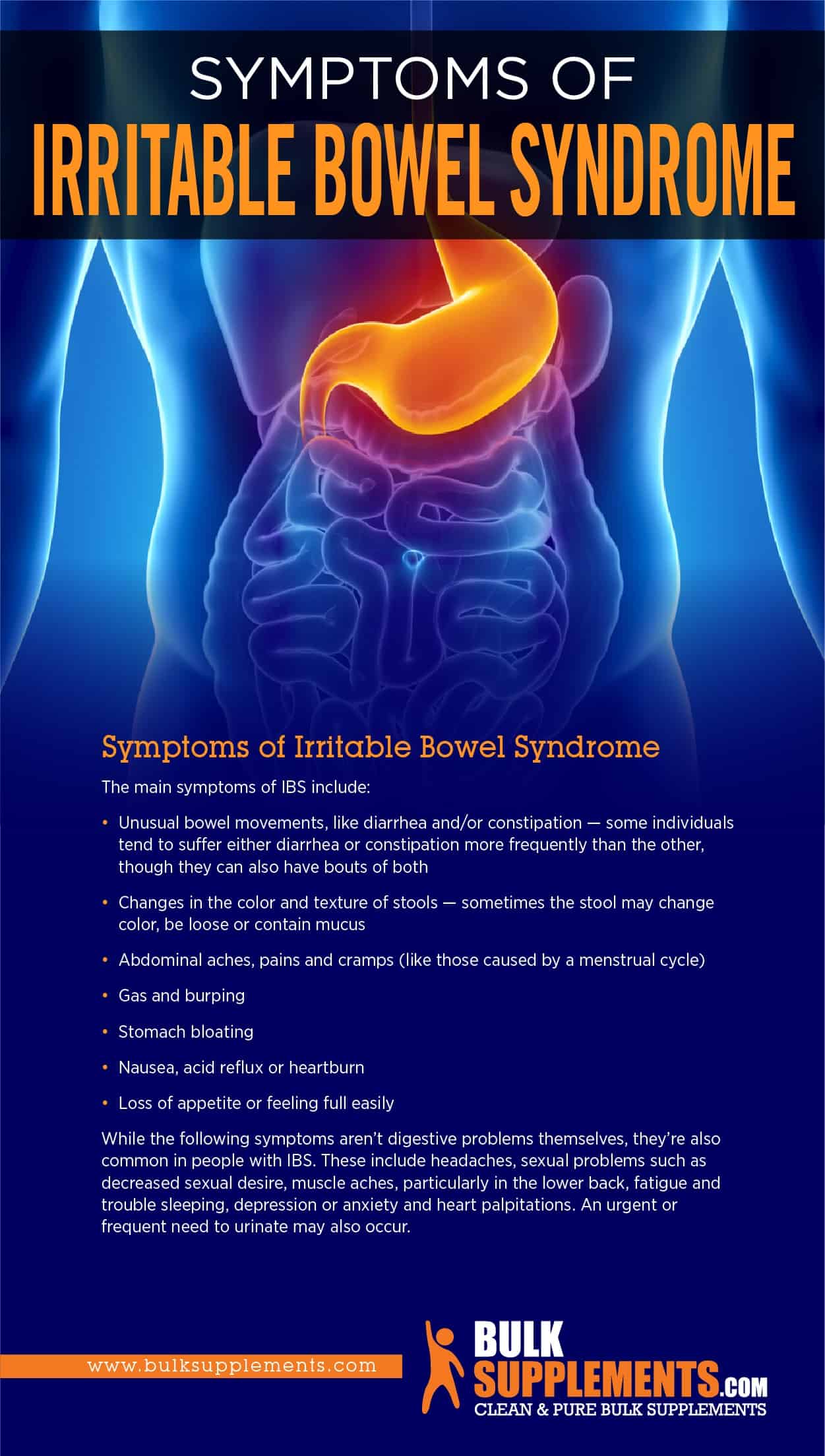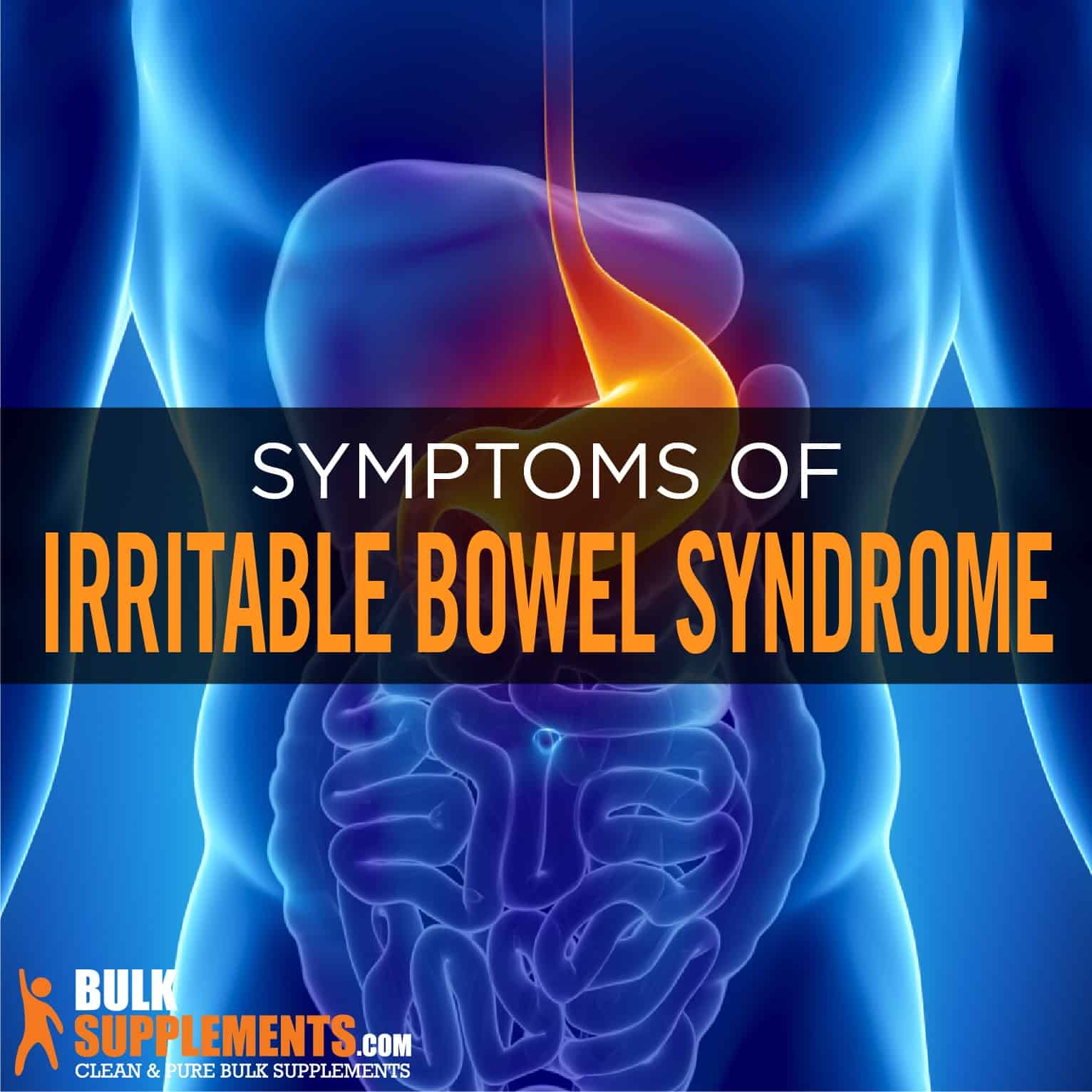What is Irritable Bowel Syndrome (IBS)?
Irritable bowel syndrome, or IBS for short, describes the occurrence of a group of symptoms that affect the digestive tract. Usually, these symptoms include abdominal pain combined with constipation, diarrhea or alternating bouts of both. These symptoms, as well as others associated with IBS, can have a negative impact on the quality of life of those who experience them.
People diagnosed with IBS don’t have any noticeable signs of disease or damage in the digestive system. Rather, IBS is considered a functional gastrointestinal disorder, meaning that the gut and the brain aren’t communicating properly. This results in problems with the way the muscles in the colon contract, causing some of the symptoms like diarrhea and constipation (x).
Even though IBS affects many people – about 10-15% of the global adult population – researchers are still trying to understand what causes it. Women, especially those under the age of 50, are twice as likely to be affected than men (x).
While the underlying cause is still unknown, there are known factors that trigger it. These triggers differ from person to person but may include sensitivity to certain foods, stress and hormone fluctuations (x).
Irritable bowel syndrome is also referred to as mucous colitis, IBS colitis, nervous colon, spastic bowel or spastic colon.
Symptoms of Irritable Bowel Syndrome
The main symptoms of IBS include (x):
- Unusual bowel movements, like diarrhea and/or constipation — some individuals tend to suffer either diarrhea or constipation more frequently than the other, though they can also have bouts of both
- Changes in the color and texture of stools — sometimes the stool may change color, be loose or contain mucus
- Abdominal aches, pains and cramps (like those caused by a menstrual cycle)
- Gas and burping
- Stomach bloating
- Nausea, acid reflux or heartburn
- Loss of appetite or feeling full easily
While the following symptoms aren’t digestive problems themselves, they’re also common in people with IBS (x). These include headaches, sexual problems such as decreased sexual desire, muscle aches, particularly in the lower back, fatigue and trouble sleeping, depression or anxiety and heart palpitations. An urgent or frequent need to urinate may also occur.

Forms of Irritable Bowel Syndrome
There are three major forms of IBS (x):
IBS-C (IBS with constipation): This is characterized by stomach discomfort, pain, bloating, delayed or infrequent bowel movements or lumpy or hard stools.
IBS-D (IBS with diarrhea): There’s stomach discomfort, pain, loose or watery stools, constant bowel movements or a pressing need to use the toilet.
IBS-M (IBS with a mix of bowel habits): With IBS-M, when you have one or more abnormal bowel movements, more than ¼ of the stools are lumpy or hard or more than ¼ of the stools are watery or loose.
Unspecified IBS (IBS-U) and post-infectious IBS (PI-IBS), which occurs after a bacterial infection in the digestive tract, are two additional subcategories (x).
Causes of Irritable Bowel Syndrome
It still remains unclear what causes irritable bowl syndrome. However, factors such as genetics and prior life experiences (e.g., infection, trauma) may play a role (x).
Treatments for Irritable Bowel Syndrome
Medicines
Your doctor can suggest medications to ease your IBS symptoms. For IBS with diarrhea, you may be prescribed drugs such as (x):
- Loperamide
- Eluxadoline (Viberzi)
- Antibiotics like Xifaxan (Rifaximin)
- Lotronex (Alosetron)
For IBS with constipation, your doctor may recommend drugs such as:
- Laxatives
- Plecanatide (Trulance)
- Lubiprostone (Amitiza)
- Linaclotide (Linzess)
Since IBS appears to stem from a brain-gut connection that may involve neurotransmitters like serotonin, antidepressants might help with abdominal pain (x). Antispasmodics and peppermint oil may also improve symptoms (x).
Probiotics
Probiotics can also help. These are live microorganisms that serve as the “good” bacteria in the gut. Probiotics can help regulate intestinal function, reduce hypersensitivity and improve the protective mucosal barrier of the gut. They also modulate immunity and reduce chronic inflammation. While probiotics may be helpful for all types of IBS, it shows particular efficacy in IBS with diarrhea. Reasonable doses (as opposed to very large doses) of a Lactobacillus and Bifidobacterium appear to provide the most advantage, according to a 2019 review of research (x).
Mental Health Therapies
Mental health therapies can also help relieve your IBS symptoms. Many techniques exist including cognitive behavior therapy, hypnotherapy and relaxation training (x). Focusing on mental health does not imply symptoms are “all in one’s head”. IBS is a physical problem that can also in part be managed through increased awareness of the stress response.
Natural Remedies for Irritable Bowel Syndrome
While medications, therapies and probiotics might help, people suffering from IBS can also take charge of their condition through natural remedies and lifestyle choices. Here are some simple lifestyle changes to consider in order to reduce the occurrence and severity of irritable bowel syndrome.
Diet Modification
Since certain foods and eating habits bring on IBS symptoms, changing your dietary habits might help. Medical professionals recommend keeping track of your diet, activity and symptoms to see if a pattern can be uncovered. Tips include:
- Avoid large meals and eat smaller, more frequent meals — this may reduce diarrhea and cramping (x)
- Focus on healthy, “real” food over processed food
- Increase fiber — vegetables, fruits, legumes, nuts and other fiber-rich foods can help boost gut health (around 20 grams of fiber is recommended daily) (x)
- Try eliminating gluten — multiple studies have revealed that eating a gluten-free diet may promote bowel function in persons with certain forms of IBS (x, x)
- Cut out dairy products like milk and cheese (x)
- Ditch caffeine (contained in teas, coffee and sodas) (x)
- Reduce alcohol consumption
Improve Hydration
Your bowels will have a difficult time moving if your stool is hard and dry, so make sure to hydrate properly. Drinking eight glasses of water daily is a great start. Healthy fluids like soothing teas and coconut water contribute to this total, but dehydrating fluids like alcohol, soft drinks and coffee don’t (x).
Drinking lots of water isn’t just for preventing constipation. It’s just as vital for people with diarrhea — in fact, even more so. As every bowel movement causes significant loss of water, you have a much higher risk of dehydration.
Get Moving
Physical activity not only burns fat and builds muscle — it’s also good for your gut. Exercise helps promote gastrointestinal function and reduces stress. Even if you don’t like intense sweat sessions, gentle exercise like yoga works just as well. In fact, research shows that having two yoga sessions daily is as effective as conventional treatments when it comes to improving IBS symptoms (x).
Supplements for Irritable Bowel Syndrome
Asparagus Extract Powder
Asparagus is a natural antioxidant that supports digestive health and strong bones. It’s also high in fiber and works as a diuretic (x). Take 2,000 milligrams of asparagus extract once a day, or as suggested by your doctor.
Bee Pollen Powder
Bee pollen naturally contains various minerals and vitamins that help with digestion (x). Take 1,000 milligrams of bee pollen powder 1-3 times a day with food, or as recommended by your physician.
Black Radish Extract Powder
Black radish may benefit gastrointestinal health, lower cholesterol, act as a detoxifier and lower the reoccurrence of gallstones (x). Take 1,000 milligrams of black radish extract daily, or as suggested by a doctor.
Chicory Extract Powder
Chicory can enhance gut health with its high fiber content. It tastes like coffee, but it’s naturally caffeine-free. This makes it a perfect option for those looking to cut down on caffeine (x). Take 5 grams of chicory extract powder 1-2 times daily, or as advised by your doctor.
Dandelion Root Extract Powder
Dandelion root extract is believed to promote gastrointestinal health. It has no fillers or additives and its roasted root is occasionally used as an alternative to coffee (x). The suggested dose for dandelion root extract is 1,000 milligrams, taken twice a day, or as recommended by a doctor.
Ginger Root Extract Powder
Ginger root extract provides multiple benefits that support overall health. But it’s mostly known for relieving digestive distress and related issues. Take 1,000 milligrams of ginger extract once a day, or as suggested by a doctor. Take with plenty of water to prevent heartburn.
Goldenseal Powder
Also called yellow root or orange root, goldenseal is believed to benefit heart and digestive health and promote immune function (x). Take 500 milligrams of goldenseal powder once or twice a day, or as suggested by your doctor.
Licorice Root Extract Powder
Licorice root extract provides headache and cough relief. It also promotes digestion and boosts your immune system (x). Take 600 milligrams of licorice root extract daily, or as advised by your doctor.
Mangosteen Extract Powder
Mangosteen extract is a natural anti-inflammatory that’s chock-full antioxidants. It benefits heart and digestive health and eases symptoms of allergies. It also helps regulate blood sugar (x). Take 3,000-6,000 milligrams of mangosteen extract powder daily, or as advised by your doctor. Individual needs may vary.
The Bottom Line
Irritable bowel syndrome is not life-threatening, but it can definitely impair a person’s quality of life. The symptoms of IBS vary, but can include abdominal pain, gas, bloating, diarrhea and/or constipation. Experts aren’t yet exactly sure what causes it, but it likely involves more than one factor including neurotransmitters, gut bacteria, diet, hormones and stress levels.
This frustrating, long-term condition has no known cure, but can be managed through medication, therapy, dietary supplements and/or lifestyle choices. Working with your healthcare professional to develop a comprehensive plan of action can provide relief.


